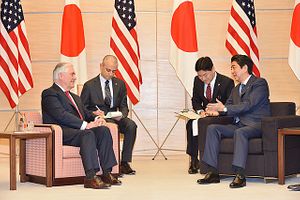One pressing issue in Japanese diplomacy and national security is the strategic implementation of the “Proactive Contribution to Peace” being heralded by Shinzo Abe’s government.
Translated into specifics, this slogan means Japan carrying some of the burden of the public good in maintaining a free and open Indo-Pacific (with a central focus on Southeast Asia), at a time when the inwardly focused Trump administration is giving cause for concern. It also means establishing a mechanism for maintaining this based on a cooperative framework that includes the United States, Australia, India, and ASEAN member states.
By reducing the burden felt by isolationist American voters, the Abe initiative will have the effect of encouraging the sustainable involvement of the United States in the region. They will also act as a precautionary measure against the worst-case scenario of the United States withdrawing from the Asian region altogether.
We can consider that the Abe administration’s diplomatic approach so far has followed a realistic diplomatic course, leaning toward neither extreme of too hawkish or too pacifistic. This approach has been symbolized by the concept of a “Proactive Contribution to Peace,” defined (as below) in Japan’s 2013 National Security Strategy.
Under the evolving security environment, Japan will continue to adhere to the course that it has taken to date as a peace-loving nation, and as a major player in world politics and economy, contribute even more proactively in securing peace, stability, and prosperity of the international community, while achieving its own security as well as peace and stability in the Asia-Pacific region, as a “Proactive Contributor to Peace” based on the principle of international cooperation. This is the fundamental principle of national security that Japan should stand to hold.
This strategic course has been devised with considerable rationality, based on Japan’s position in the international environment, as follows. North Korea is working vigorously to develop nuclear missiles capable of reaching the mainland United States. It could conceivably acquire this capability within a matter of months. Meanwhile, China is expanding its sphere of influence in the East and South China Seas with little respect for existing international rules. With its One Belt and One Road (OBOR) initiative, among others, it is also attempting to expand its economic influence further afield, from surrounding Asian nations to other countries in Europe and Africa.
China is taking advantage of the United States’ growing isolationism to advance its own strategic initiatives. U.S. President Donald J. Trump and his administration have pulled the U.S. out of the Trans-Pacific Partnership (TPP) – which agreed progressive commercial and economic rules for the region – and from the Paris Agreement on climate change measures, and are effectively scoring “own goals” that are damaging the country’s soft power. China is well aware of this.
Russia, meanwhile, continues to intervene in the affairs of countries such as the Ukraine and Syria (which are in a state of civil war) and is using its military power to keep the Baltic nations in check, leaving tensions in its relationship with NATO worse than at any time since the end of the Cold War. Abe’s government has continued to build cooperative relations with NATO, and the significance of this also lies in preventing the collapse of the military balance in Asia, due to factors such as the relaxation of hitherto restricted weapons exports by European nations due to their absorption, for purely economic reasons, into China’s OBOR initiative.
The inner workings of the Trump administration are characterized by a tug-of-war between two factions: “Realists” such as White House Chief of Staff John F. Kelly and Secretary of Defense James Mattis, and “Destroyers of the Status Quo,” led by the likes of erstwhile White House chief strategist Stephen Bannon and senior policy advisor Stephen Miller. Trump’s own tendencies towards the latter camp have also done much to diminish America’s soft power.
The good news is that, in terms of diplomacy and security policy in the Asian region, the realists stand at an advantage. Meanwhile, the destroyers, too, consider China to be a threat, particularly in terms of trade and economic aspects. Abe’s personal rapport with Trump is another positive addition to the mix.
Trump’s concept of a “Free and Open Indo-Pacific,” which he emphasized during his visit to Asia in November 2017, is understood as incorporating the Security Diamond concept previously put forward by Abe.
In this context, Japan’s provision of capacity building assistance for the nations of the Indo-Pacific region together with public goods under the banner of Proactive Contribution to Peace are critical issues in Japanese diplomacy, and are compatible with the U.S.-Japan alliance.
In an interview with The Nihon Keizai Shinbun on October 25, 2017, Japanese Foreign Minister Taro Kono declared that the Japanese government will aim to achieve a strategic dialogue between the leaders of four nations: Japan, the United States, Australia and India. This is an important point, and his comment that “free and open seas will benefit all countries, including China and its One Belt One Road initiative” demonstrates a good understanding of the essential nature of public goods.
Ultimately, the modernization of China’s military capabilities is underpinned by economic growth, and is underwritten by the stability of the regional environment and transportation routes. Given that understanding, then in the long term there is need for China, too, to carry some of the burden of public goods, and to be absorbed into the rule systems and cooperative frameworks of the region. That said, it is self-evident that it will not be easy for an emerging China to advance in that direction, and it is for precisely this reason that it is critically important to ensure a continued U.S. military presence in the region, while at the same time creating mechanisms for the regional cooperation that is required to support this.
Tsuneo Watanabe is a Senior Fellow at The Sasakawa Peace Foundation.
































